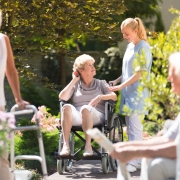Planning for National Friendship Day in Senior Housing
National Friendship Day is celebrated annually on the first Sunday of August, which will be August 3 this year. This special day honors the value of close, supportive relationships and the joy of connecting with others. In senior housing communities, where daily interaction plays a key role in emotional well-being, this celebration offers an opportunity to highlight and strengthen meaningful friendships among residents. Recognizing these bonds can uplift spirits and foster a deeper sense of belonging and purpose.
The Power of Social Connection in Senior Housing
Meaningful social connections, including friendships, can hold tremendous power for older adults, especially those in senior housing. In later years, maintaining regular companionship becomes more than a pleasant bonus; it plays a significant role in how individuals experience daily life. As routines shift and families grow distant, the presence of peers who offer mutual understanding and support grows even more vital.
Physical Health Benefits
Social connections have been closely linked to better physical health outcomes among seniors. Regular interaction may help promote healthier routines, such as balanced meals, regular physical activity, and improved sleep. Studies also show that staying socially engaged can help lower the risk of high blood pressure, heart disease, and cognitive decline.
Emotional Well-Being and Happiness
Friendships and social ties play a significant role in a person’s emotional well-being. For seniors, having trusted companions to talk to or laugh with can ease feelings of loneliness and bring more enjoyment to everyday moments. Shared experiences often create a greater sense of belonging and fulfillment.
Support Through Life’s Challenges
Resilience also grows stronger when older adults have others to rely on. Social connections often act as an emotional buffer, helping individuals recover more smoothly from personal loss, illness, or other life transitions. Simply knowing someone cares can make the toughest days easier to face.
How Senior Housing Fosters Friendship
Friendships play a vital role in creating a strong sense of belonging, especially in a senior community environment where daily interactions shape the rhythm of everyday life. In these communities, friendships do more than fill time, as they also offer connection, companionship, and comfort during a meaningful stage of life.
There are many ways senior housing can help residents build and nurture friendships:
- Communal spaces make it easy for residents to engage in casual conversations
- Shared routines encourage regular interactions and familiarity
- Organized activities create natural chances for connection
- Mealtime settings bring residents together around shared tables
- Volunteer opportunities promote teamwork and bonding
- Special events and group celebrations foster shared memories
Strong, supportive friendships formed in senior communities often become a source of joy, encouragement, and purpose that enriches daily living in ways nothing else can.
Ideas for Friendship Day Activities
National Friendship Day is an ideal opportunity to celebrate the social connections that support seniors in thriving within community living. Small, shared moments and group experiences can uplift spirits and deepen relationships among peers.
Here are some easy-to-plan activity ideas that staff can organize for residents:
- Host a themed friendship brunch or tea party
- Create a “memory lane” photo wall of resident friendships
- Set up a friendship bracelet or card-making station
- Organize partner games or a friendly trivia challenge
- Offer a music hour with sing-alongs or resident performers
- Plan a storytelling circle where residents share friendship memories
- Coordinate a buddy walk around the community grounds
These shared experiences can spark joy, create new bonds, and remind everyone of the enduring value of meaningful companionship at every stage of life.
Are you seeking exceptional senior care in Nebraska? Click here to learn all about Richmont Senior Living!
Richmont Senior Living is proud to serve Ashland, NE and the surrounding cities: Memphis, Springfield, South Bend, Greenwood, Murdock, Waverly, Murdock, Ithaca, and Chalco











